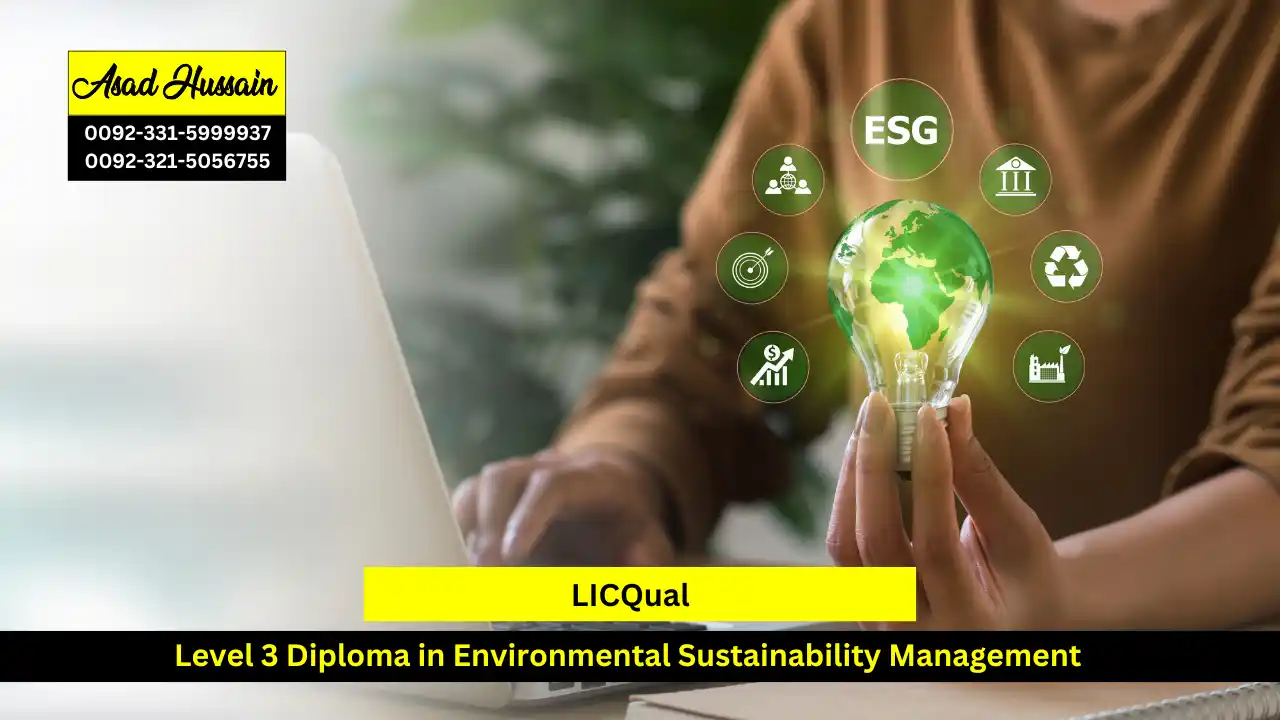In today’s world, environmental sustainability is more than just a buzzword—it’s a necessity. With increasing concerns about climate change, resource depletion, and environmental degradation, businesses and organizations are seeking professionals who can guide them toward more sustainable practices. The Level 3 Diploma in Environmental Sustainability Management is a key qualification for those looking to make a significant impact in this vital field.
The Level 3 Diploma in Environmental Sustainability Management is a comprehensive program designed to equip individuals with the knowledge and skills needed to manage and implement environmental sustainability initiatives effectively. It focuses on understanding the principles of environmental sustainability, regulatory requirements, and best practices for reducing environmental impact.
The Level 3 Diploma in Environmental Sustainability Management is a valuable qualification for anyone committed to advancing environmental sustainability. By gaining expertise in sustainability management, regulatory compliance, and practical implementation strategies, graduates are well-equipped to drive positive environmental change. As organizations increasingly prioritize sustainability, this diploma provides a solid foundation for a rewarding career in this crucial field.
Program Highlights
Mandatory Units
- Environmental Policy and Legislation
- Sustainable Resource Management
- Environmental Impact Assessment
- Climate Change Mitigation and Adaptation Strategies
- Corporate Social Responsibility
- Green Technology and Innovation
Educational Background:
- Minimum Requirement: Typically, candidates should have a minimum of four GCSEs at grade C/4 or above, including English and Mathematics. Alternatively, an equivalent qualification, such as a Level 2 Diploma in a related field, may be accepted.
- Preferred Background: A background in environmental science, biology, or a related subject is advantageous but not mandatory.
Work Experience:
- Not Required: Formal work experience is not a strict requirement for entry. However, having experience in a relevant field (e.g., environmental management, sustainability, or business management) can be beneficial and might strengthen your application.
Age Requirement:
- Minimum Age: Candidates are usually required to be at least 16 years old. Some institutions may have different age requirements based on their specific policies.
Language Proficiency:
- English Language Skills: For non-native English speakers, proof of English language proficiency is required. This can be demonstrated through a recognized English language test (e.g., IELTS, TOEFL) or evidence of equivalent proficiency.
Technical Skills:
- Basic Computer Skills: Familiarity with basic computer operations and software (such as Microsoft Office) is necessary, as the course involves writing reports, conducting research, and using digital tools.
Environmental Policy and Legislation
- Understand Key Legislation: Identify and explain major environmental policies and regulations at national and international levels.
- Policy Application: Demonstrate how to apply environmental policies to organizational practices.
- Compliance Assessment: Assess an organization’s compliance with environmental legislation and recommend improvements.
- Policy Development: Develop policies and procedures to address regulatory requirements and enhance environmental performance.
Sustainable Resource Management
- Resource Efficiency: Explain the principles of sustainable resource management and strategies for improving resource efficiency.
- Waste Reduction: Develop and implement waste reduction plans to minimize environmental impact.
- Resource Conservation: Analyze and apply methods for conserving natural resources in various sectors.
- Sustainability Metrics: Measure and report on resource use and sustainability performance within organizations.
Environmental Impact Assessment
- Assessment Methods: Understand and apply methods for conducting environmental impact assessments (EIAs).
- Impact Identification: Identify potential environmental impacts of projects and activities.
- Mitigation Strategies: Develop and recommend strategies to mitigate negative environmental impacts.
- Reporting: Prepare comprehensive EIA reports and communicate findings effectively to stakeholders.
Climate Change Mitigation and Adaptation Strategies
- Mitigation Techniques: Explain and implement strategies for mitigating climate change effects, including reducing greenhouse gas emissions.
- Adaptation Planning: Develop adaptation plans to address the impacts of climate change on organizations and communities.
- Policy Integration: Integrate climate change mitigation and adaptation strategies into organizational policies and practices.
- Impact Monitoring: Monitor and evaluate the effectiveness of climate change mitigation and adaptation measures.
Corporate Social Responsibility (CSR)
- CSR Principles: Understand the principles and practices of corporate social responsibility and their relevance to environmental sustainability.
- CSR Strategies: Develop and implement CSR strategies that align with organizational goals and environmental objectives.
- Stakeholder Engagement: Engage with stakeholders to address social and environmental concerns and enhance CSR initiatives.
- Reporting and Evaluation: Create CSR reports and evaluate the impact of CSR activities on the organization and its stakeholders.
Green Technology and Innovation
- Green Technologies: Identify and assess various green technologies and their applications in promoting environmental sustainability.
- Innovation Integration: Integrate green technologies and innovative practices into organizational processes and strategies.
- Technology Evaluation: Evaluate the effectiveness of green technologies in reducing environmental impact and improving resource efficiency.
- Future Trends: Analyze emerging trends in green technology and their potential impacts on environmental management practices.
The Level 3 Diploma in Environmental Sustainability Management is designed for individuals who are passionate about making a positive impact on the environment and seeking to advance their careers in sustainability. This course is ideal for those who are already working in or aspiring to enter roles related to environmental management, sustainability, or corporate social responsibility. It is particularly well-suited for recent graduates with a background in environmental science or related fields, as well as professionals looking to enhance their knowledge and skills in managing environmental initiatives. Additionally, the course is beneficial for business managers and sustainability coordinators aiming to integrate effective environmental practices within their organizations. Whether you are transitioning into the field or seeking to build on existing expertise, this diploma provides the foundation needed to drive meaningful change in environmental sustainability.







